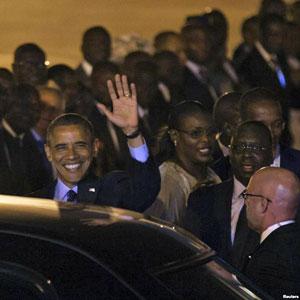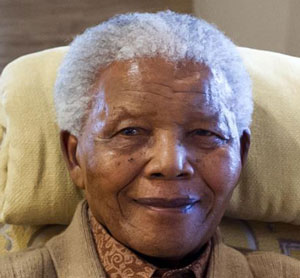
President Obama left Wednesday, June 26, on a three-country tour of Africa, first stopping in Senegal before traveling to South Africa where there is a chance that the first black American President will meet South Africa’s first black president, Nelson Mandela.
Today marks two-weeks in the hospital for the 94-year-old Mandela for a recurrent lung infection. On June 25, Mandela’s family held a meeting at his ancestral home to discuss "sensitive family matters," potentially plans for his burial.
While in South Africa, President Obama plans to visit Robben Island. Mandela spent 18 of his 27-year prison sentence there, and Obama wants to reach out to African youth with a speech at the University of Cape Town.
However, the President is already under fire at home for the trip, with costs ranging between $60 to $100 million dollars, which according to classified documents obtained by The Washington Post includes, hundreds of U.S. Secret Service agents, a Naval aircraft carrier with a fully-staffed medical trauma center stationed offshore. There are also numerous other security measures in place such as 24-hour continual air coverage by fighter jets flying in shifts, and 56 support vehicles, including 14 limousines for the president and first lady, etc.
Black economic commentator, William Reed noted, Obama doesn’t have an African-American business delegation with him, concluding, “The trip will show the continent’s ‘Homeboy’ to be no different than his 43 White predecessors: a paternal view of Africa as development cases, rather than opportunities for partnership.”
Emira Woods, co-director of the Institute for Policy studies, said at a June 24 press conference in Washington, D. C. that, “President Obama’s trip is likely to focus on trade and investment, but (in reality) U.S. policy toward Africa has been driven by militarism and resource extraction. Instead, the U.S. should bolster Africa’s dramatic economic rise.”
An open letter by the Africa Advocacy Network is also critical of the Obama Administration’s African policy and calls for “a new approach to trade and investment, militarization, agriculture, and land policy.”
But when President Obama arrives in South Africa, the welcome may not be as warm and fuzzy as the U.S. media is possibly reporting. The “NObama Coalition Cape Town" has aligned itself with the “NObama Johannesburg,” forming a coalition of nearly 30 organizations - including trade unions and student groups - that are mobilizing widespread protests against Obama’s visit to South Africa, even rejecting the honorary doctorate awarded to Obama by the University of Johannesburg. It is apparent that some ethnic groups in Africa are not open to President Obama or his administration.
“We call for the masses across Africa to also mobilize protest actions against the Obama visit, and to (be) ready at a moment’s notice, to come to the areas where Obama may appear, so we can protest, and issue our own warrant of arrest for Obama.”
They are planning protests for June 26 & 27 opposite the Civic Centre in Cape Town to “reject freedom of the city for Obama.,” and on June 28 at the parliament to protest the South African government’s role in inviting Obama and “their complicity in allowing plunder by U.S. monopolies.”
 The protesters issues include, “Monopoly capitalists and banks, mainly from the U.S., are responsible for the ongoing plunder of trillions of dollars of wealth from Africa each year. This is the main reason why most of the youth have no future – the masses are unemployed and the few who work earn starvation wages.” The protestors also want Obama to “end all support for Israel,” since African refugees are denied the right to work in Israel and many are coerced to sign “voluntary repatriation” forms.
The protesters issues include, “Monopoly capitalists and banks, mainly from the U.S., are responsible for the ongoing plunder of trillions of dollars of wealth from Africa each year. This is the main reason why most of the youth have no future – the masses are unemployed and the few who work earn starvation wages.” The protestors also want Obama to “end all support for Israel,” since African refugees are denied the right to work in Israel and many are coerced to sign “voluntary repatriation” forms.
Africa is rapidly becoming an important player in the global economy since it contains seven of the world’s ten fastest growing economies, and President Obama in re-thinking current American policy toward Africa. Ben Rhodes, Obama's deputy national security adviser told the AP that the White House is hoping for an increased foothold for U.S. businesses on a continent where China and other emerging economies are already major players. "If the United States is not leading in Africa, we're going to fall behind in a very important region in the world," Rhodes said.
“What the peoples of Africa are asking for is U.S. policy that will first do no harm,” says Mwiza Munthali of TransAfrica. “The U.S. involvement many times has had a negative effect, not positive, and at times has actually thwarted the progress that Africa has made.”
